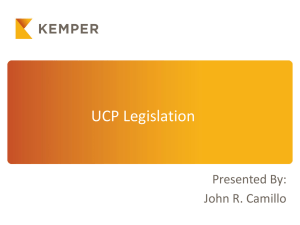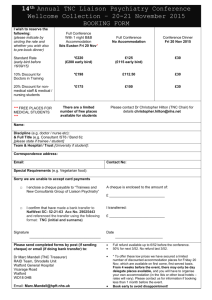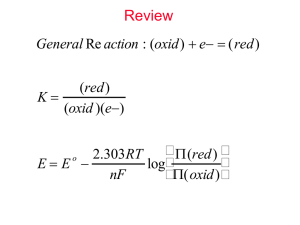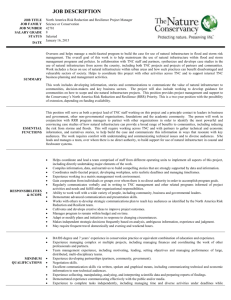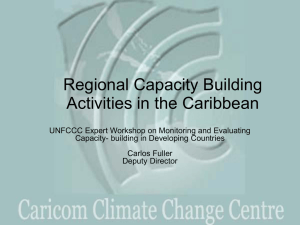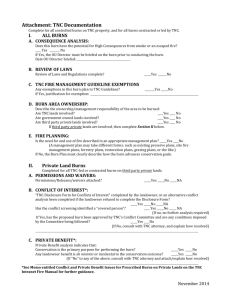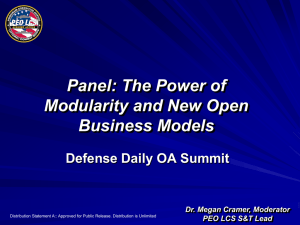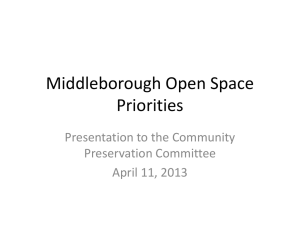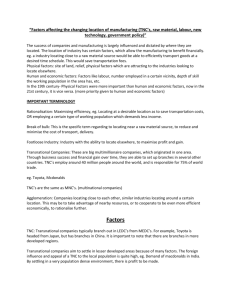for immediate release - National Conference of Insurance Legislators
advertisement
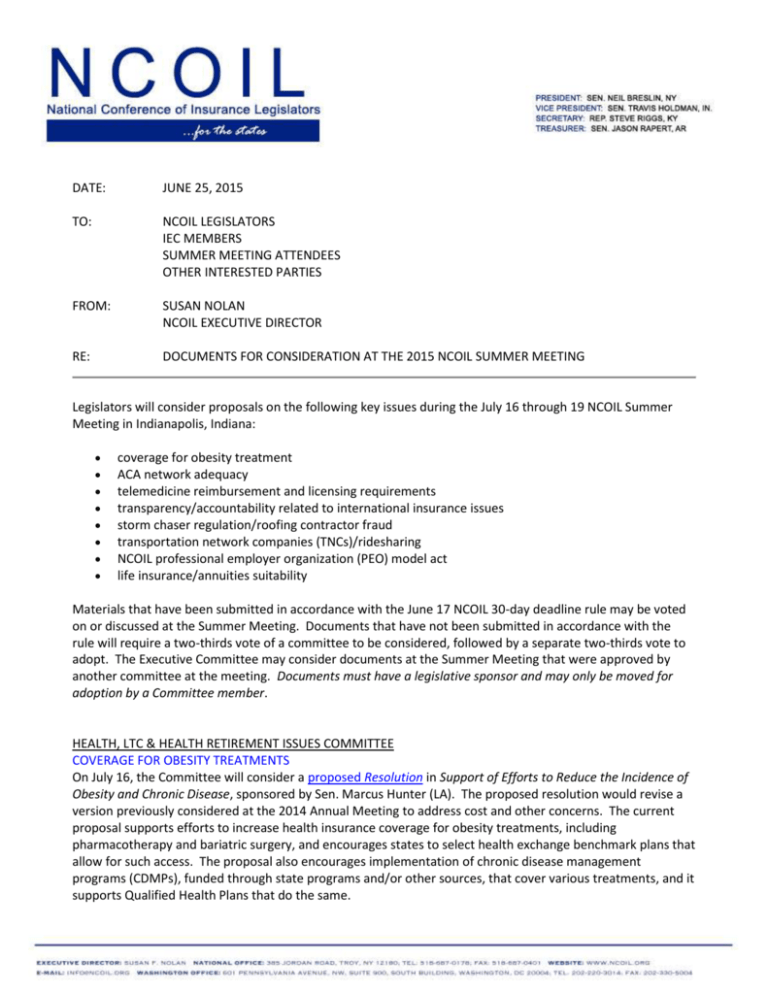
DATE: JUNE 25, 2015 TO: NCOIL LEGISLATORS IEC MEMBERS SUMMER MEETING ATTENDEES OTHER INTERESTED PARTIES FROM: SUSAN NOLAN NCOIL EXECUTIVE DIRECTOR RE: DOCUMENTS FOR CONSIDERATION AT THE 2015 NCOIL SUMMER MEETING Legislators will consider proposals on the following key issues during the July 16 through 19 NCOIL Summer Meeting in Indianapolis, Indiana: coverage for obesity treatment ACA network adequacy telemedicine reimbursement and licensing requirements transparency/accountability related to international insurance issues storm chaser regulation/roofing contractor fraud transportation network companies (TNCs)/ridesharing NCOIL professional employer organization (PEO) model act life insurance/annuities suitability Materials that have been submitted in accordance with the June 17 NCOIL 30-day deadline rule may be voted on or discussed at the Summer Meeting. Documents that have not been submitted in accordance with the rule will require a two-thirds vote of a committee to be considered, followed by a separate two-thirds vote to adopt. The Executive Committee may consider documents at the Summer Meeting that were approved by another committee at the meeting. Documents must have a legislative sponsor and may only be moved for adoption by a Committee member. HEALTH, LTC & HEALTH RETIREMENT ISSUES COMMITTEE COVERAGE FOR OBESITY TREATMENTS On July 16, the Committee will consider a proposed Resolution in Support of Efforts to Reduce the Incidence of Obesity and Chronic Disease, sponsored by Sen. Marcus Hunter (LA). The proposed resolution would revise a version previously considered at the 2014 Annual Meeting to address cost and other concerns. The current proposal supports efforts to increase health insurance coverage for obesity treatments, including pharmacotherapy and bariatric surgery, and encourages states to select health exchange benchmark plans that allow for such access. The proposal also encourages implementation of chronic disease management programs (CDMPs), funded through state programs and/or other sources, that cover various treatments, and it supports Qualified Health Plans that do the same. NETWORK ADEQUACY MODEL On July 16, the Committee will consider a proposed Model Act to Ensure Meaningful Access to Accurate Provider Directories, sponsored by Rep. Deborah Ferguson (AR) and brought forward by the American Medical Association (AMA). The proposed model would require insurance department approval of insurance company provider directories, as well as of annual updates; would identify various contact and other information that must be included in a directory, including whether physicians and other providers are accepting new patients; and would set rules for publishing and updating directories. The proposed model also would, among other things, lay out rules for enforcement and allow for private rights of action. TELEMEDICINE During a special meeting on July 17, the Committee will discuss two proposed model laws sponsored for discussion by Rep. Brian Kennedy (RI) and brought forward by the American Medical Association (AMA). A proposed Model Telemedicine Reimbursement Act would require coverage for telemedicine services that would be on par with coverage for in-person treatments. The proposed model also would, among other things, prohibit insurers from excluding coverage for a service solely because it is provided through telemedicine. A proposed Model Telemedicine Licensure Act would, in part, require physicians treating patients to be licensed in the state in which the patient receives care, as well as to be regulated by that state’s Board of Medicine. INTERNATIONAL INSURANCE ISSUES COMMITTEE/INTERNATIONAL ISSUES TASK FORCE TRANSPARENCY/ACCOUNTABILITY REGARDING INTERNATIONAL INSURANCE ISSUES On July 16, during a joint Committee/Task Force meeting, legislators will consider a proposed Resolution in Support of Federal Legislation that Supports Transparency, Accountability, and the U.S. System of State-Based Insurance Regulation, co-sponsored by Committee Chair Rep. Bill Botzow (VT) and Task Force Chair Sen. Dan “Blade” Morrish (LA). The proposed resolution furthers NCOIL initiatives to preserve state-based oversight and highlights the success of the U.S. system, noting its transparency and inclusiveness. The proposed resolution also supports S. 1086, the International Insurance Capital Standards Accountability Act of 2015, and H.R. 2141, the International Insurance Standards Transparency Act. NOTE: The draft resolution was submitted after the 30-day deadline for the Summer Meeting and so will require a two-thirds vote for Committee consideration and a separate two-thirds vote for adoption. PROPERTY-CASUALTY INSURANCE COMMITTEE ROOFING CONTRACTOR FRAUD/STORM CHASER REGULATION On July 18, the Committee will consider a proposed Model Storm Chaser Consumer Protection Act, cosponsored by Sen. Jason Rapert (AR) and Rep. Rich Golick (GA). The proposed model would establish minimum standards for roofing contracts and would (1) require various disclosures, including an approximate cost estimate; (2) allow a consumer to cancel the contract if the consumer’s insurer denies all or part of the claim; (3) require a contractor to return any payments or deposits that the consumer made to the contractor except for cost of providing emergency services if the consumer cancels the contract; (4) require contractors to maintain certain insurance coverages; (5) establish contractor prohibitions, penalties, and licensing requirements; and (6) allow certain exemptions. The proposed model was revised from a 2015 Spring Meeting version and now would use registration fees to help fund enforcement of the Act, would streamline the registration process for contractors who are registered in good standing in another state, and would add enforcement provisions, among other changes. TRANSPORTATION NETWORK COMPANIES (TNCs)/RIDESHARING On July 18 and July 19, the Committee will consider a proposed Model Act to Regulate Insurance Requirements for Transportation Network Companies and Transportation Network Drivers, sponsored by Rep. Michael Stinziano (OH). The proposed model is similar to a new Indiana law that incorporates provisions found in an Uber/property-casualty insurer “compromise” approach being circulated in the states. The draft NCOIL model would require primary auto liability insurance purchased by the TNC driver and/or by the TNC to cover (1) the period in which the TNC driver is logged into the TNC’s online system and is available to receive a transportation request and (2) the period during which the TNC driver is transporting a rider. Under the proposed NCOIL model, automobile insurers could exclude personal-lines coverage for losses that take place during those periods. The draft model also would require certain disclosures to TNC drivers, would require a TNC to have a permit from the state before it could operate there, would establish rules regarding who could serve as a TNC driver, and among other things would specify that a TNC may meet its insurance requirements by purchasing coverage through an insurer that’s highly rated by A.M. Best or Demotech. WORKERS’ COMPENSATION INSURANCE COMMITTEE NCOIL PROFESSIONAL EMPLOYER ORGANIZATION MODEL On July 16, the Committee will discuss state PEO requirements as related to provisions in a 2007 NCOIL Model Act Regarding Workers’ Compensation Insurance Coverage in Professional Employer Organization (PEO) Relationships, to help determine the extent to which NCOIL-based requirements exist throughout the country. Discussion will build on May 4 conference call of the Committee’s PEO Task Force, during which legislators and interested parties identified three areas that may warrant additional Committee consideration: solvency, lines of responsibility, and timing as related to how entering/leaving a PEO relationship may impact a PEO client’s workers’ compensation coverage. The PEO Task Force was created during the 2015 Spring Meeting in response to concerns over proposed amendments to the NCOIL model. As adopted, the NCOIL model requires PEO registration and, among other things, establishes that workers’ comp insurance premiums are determined using a PEO client’s risk exposure and claims experience. SPECIAL SESSIONS ACA NETWORK ADEQUACY: WHAT’S NEXT FOR STATES? On July 17, legislators will hear expert insight regarding network adequacy requirements, including how state requirements differ; what can be done to balance costs, quality, and access; what information consumers need and where should they receive it; and how network adequacy affects contracting between health plans and providers/facilities. Panelists also will discuss how the federal government should factor in. The session will include perspectives from American’s Health Insurance Plans (AHIP), the American Heart Association (AHA), American Medical Association (AMA), and the Wisconsin Office of the Commissioner of Insurance, speaking on behalf of the NAIC. A QUESTION OF SUITABILITY: WHAT MAKES LIFE INSURANCE PRODUCTS WELL-MATCHED FOR A CONSUMER? On July 18, legislators will explore what criteria should be used to determine suitability, how state regulation has evolved, whether states are doing enough, and what steps life insurers are taking. The session also will look at the impact of changing markets and new products. The interactive session will include perspectives from the American Council of Life Insurers (ACLI), Center for Insurance Research (CIR), Financial Industry Regulatory Authority (FINRA), Insurance Retirement Institute (IR), Iowa Insurance Division/NAIC, and the National Association of Insurance & Financial Advisors (NAIFA). Please contact the NCOIL National Office at 518-687-0178 or at info@ncoil.org with any questions regarding 30-day materials. © National Conference of Insurance Legislators (NCOIL) K:/NCOIL/2015 Documents/2008500b.doc
